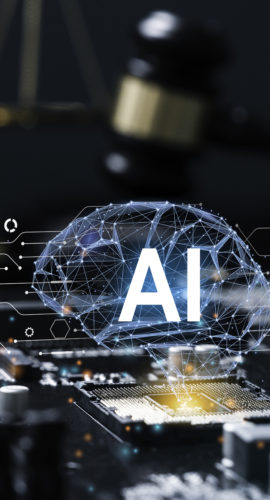Artificial Intelligence (AI)
Empowering your AI journey.
We understand the transformative power of artificial intelligence (AI) in reshaping industries and redefining legal boundaries. Our focus includes machine learning (ML) and advanced applications like generative AI (GenAI) and large language model (LLM) platforms. Our dedication to this rapidly evolving domain has allowed us to provide specialized support and guidance on regulatory compliance, litigation and transactional matters. Furthermore, recognizing that AI intersects with virtually every sector and business function, our industry-specific teams are poised to bring in-depth knowledge of your business, providing tailored solutions to AI challenges unique to your industry.
Our commitment goes beyond service delivery. We pride ourselves on being thought leaders in AI legal discussions. Clients choose Frost Brown Todd not just for our experienced judgement but also for our forward-thinking approach, driven by a team of tech-savvy lawyers who have first-hand knowledge of your industry and are ready to roll up their sleeves and problem solve with you.
AI Services at a Glance
|
Key Contacts

Partner
Nashville, TN

Practice Group Leader
Cincinnati, OH

Partner
Indianapolis, IN
How We Help Clients
Artificial intelligence is transforming the way businesses recruit talent, monitor employee performance, engage with employees, and process day-to-day Human Resources functions. With new technology comes new legal issues, and we make sure businesses receive the full benefit, without the corresponding risks, associated with implementing AI in the workplace.
We help employers navigate the novel legal issues that arise when preparing for and implementing the latest advances in artificial intelligence in the workplace. Whether it’s negotiating the use of AI in collective bargaining agreements; reasonable accommodation concerns related with AI powered recruiting tools; updating policies and evaluating potential bias issues surrounding AI-powered employee monitoring tools; or advising on the latest laws and guidance impacting employers, our attorneys are ahead of the curve and available to help your business.
Capabilities
- Guide employers through the evolving legislation and legal guidance on the use of AI in the workplace.
- Evaluate risk of disparate impact and bias in utilizing AI-powered recruiting and performance management.
- Draft policies to protect confidential business information and trade secrets utilized by AI software.
- Counsel businesses on potential reasonable accommodations needed by applicants and employees using virtual assistants and other AI.
- Draft policies to protect employees’ privacy.
- Negotiate the use of AI in the workplace in collective bargaining agreements.
- Advise on proper notices and policies needed for AI-powered performance management.
Experience
- Drafted notice and policies for employee performance management software.
- Advised on potential bias of AI-powered recruiting tools (e.g., virtual assistants, resume reading tools, etc.).
- Counseled employers on impact of latest EEOC guidance on the use of artificial intelligence in the workplace.
-
 Anne E. Duprey
Anne E. DupreyPartner
Columbus, OH
Artificial intelligence models and applications of all types depend on large datasets to train and improve AI-based solutions. Given the litigation and other legal issues surrounding generative AI, machine learning, and other AI systems, businesses that want to improve their competitiveness by using AI-enhanced products are wise to perform due diligence and take into account critical data security and privacy concerns when establishing a governance program. Our team guides companies through the legal aspects of this quickly expanding technology, helping to ensure all the data involved in the AI—whether input data used to train or output data supplied by the solutions—meets legal and ethical requirements. Privacy and cybersecurity compliance rank high on a governance program checklist, but accuracy, reliability, safety, transparency of system operation and governance, and ownership rights are also crucial. Our team appreciates the importance of effectively working with your business stakeholders to evaluate privacy, cybersecurity, and other data risks associated with your development, purchase, transfer, or use of AI.
Capabilities
- AI privacy and cybersecurity impact assessments
- AI governance programs
- AI risk analyses
- Transparency and consent
- AI contract review and drafting
- M&A services related to AI assets
Experience
- Created tailored governance programs for the discrete parts comprising AI systems and the systems as a whole.
- Drafted tailored AI workplace policies for employee guidance and use of AI.
- Provided guidance on network privacy and data security issues to foundationally support AI development.
- Analyzed risks to AI-related assets in M&A transactions.
We work with manufacturers to harness the benefits of AI while minimizing risks. Our role is to guide clients as they build, procure, and deploy AI technologies across various facets of their business operations, from product development and manufacturing to distribution and customer support. By strategically implementing AI solutions, manufacturing companies can create efficiencies and improve processes (such as supply chain optimization and predictive analytics in marketing, design, and equipment maintenance), while also enhancing workforce productivity and safety/quality control measures. All of which can reduce costs and timelines for manufacturers and suppliers.
We also advise clients on the integration of AI technologies in their commercialized products. Key issues for manufacturers to consider are intellectual property rights management, confidentiality protection, and accountability. AI use cases for manufacturers are vast, and as companies are not only deploying new technologies within their businesses, but also to customers and consumers, clients need informed counsel savvy on the technical aspects and legal risks of AI. There are many current laws and regulations guiding the ethical and responsible use of AI, with new laws and guidance developing all the time. Issues at hand for our manufacturing clients include algorithmic bias, intellectual property loss or infringement, and the potential for torts and litigation when errors result in liabilities, property damage or physical harm. Because our AI team understands both the technology and the legal landscape, we can help manufacturers and suppliers boldly and confidently leverage innovation to capture real-world value from their AI integrations.
Representative Manufacturing Experience
- Advised industrial manufacturer in various technology agreements, including master service agreements related to custom AI model trained on client data, as well as company policy governing their employees’ use of AI.
- Assisted manufacturer in the mobility sector with data syndication agreements and related licensing issues.
- Represented major developer and manufacturer of health care technology in managing their extensive patent and trademark portfolio, including its machine learning and artificial intelligence related business units.
- Represented AI and machine learning-based technology company operating in the manufacturing industry with immigration matters for specialized and technical workforce.
- Provided patent prosecution services for a software company using AI to provide analytics and recommendations for direct marketing campaigns.
-
 Matthew R. Schantz
Matthew R. SchantzPartner
Indianapolis, IN
The advertising, entertainment, and media industries require special considerations when looking at the impact of artificial intelligence on their operations and consumer base. While generative AI creates resources and opportunities to assist in content creation, there are many risks for creators, rights holders, entrepreneurs, and other stakeholders. Our team has the experience and sophistication to advise clients on how to appropriately leverage AI solutions. We can help you determine the best course of action to protect and enforce your property rights and navigate opportunities, risks and other challenges with respect to your business and AI. Our support and solutions are tailored to your specific needs, including considerations for advertisers using AI for FTC compliance, licensing and ownership of AI-created content, and enforcement of creators’ rights.
Capabilities
- Truth in advertising
- Influencer agreements
- Enforcement of rights for content-creators
- Registration, protection, and licensing content generated with the assistance of AI models
- Business development for AI start-ups in the entertainment and media space
- Protection, enforcement, and licensing of personal rights/NIL rights in AI models, such as voice models
Experience
- Advised a client using AI for communications on the relationship between federal regulatory requirements and their AI product.
- Advised a client with a machine learning “fingerprinting” model to identify copyright infringement on platforms utilizing user-generated content.
- Advised a client in enforcement of personal rights, including AI-generated models.
- Provided thought leadership on protection and enforcement of music copyrights in AI training and generation.
AI has emerged as a vital tool to enhance patient care by enabling personalized treatment, decreasing errors, improving diagnostics, and reducing health care costs across the industry. It has also streamlined health care operations (staffing, revenue cycle management), research, and drug discovery. As new advances and AI applications radically transform the health care system as we know it, companies are faced with an urgent and intricate task—managing the legal and ethical risks associated with AI. We understand the additional challenges health care businesses assume given the industry’s complex regulatory overlay and liability exposure.
The successful use of AI in health care begins with responsible AI governance. While data is the key to achieving the promise of AI, it is also its biggest threat. Outputs, inputs, and training models face ownership considerations such as intellectual property rights and infringement. Also at hand are significant privacy and data security concerns, as well as contractual issues such as representations and warranties in procurement or M&A contexts. Contractual obligations also can cause nuanced issues when applications and data are used across third party providers. Potential for torts and litigation resulting from actions and outcomes attributable to AI technologies are also key issues to consider. We work with clients across the health care continuum to identify and manage these risks to maximize the full benefits that AI has to offer health plans, providers, device and pharmaceutical manufacturers, health and wellness companies, and those providing technology and other products or services to the health care industry.
Representative Health Care Experience
- Drafted and negotiated a large health data licensing arrangement involving use of AI data analyses by licensee.
- Worked with statistician to determine the risk of use with AI system of data certified as de-identified under HIPAA.
- Managed large health care transaction for publicly traded business that included provisions governing data analyses using AI.
- Provided patent prosecution services for a health technology company utilizing machine learning to predict real-time sales demand of illness-related products.
- Handled patent application and prosecution related to AI processing systems and diagnostic workflow for health care technology company.
- Represented major developer and manufacturer of health care technology in managing their extensive patent and trademark portfolio, including its machine learning and artificial intelligence related business units.
- Assisted health care technology companies operating AI-based back-office support services for providers in business formation and development of service contracts.
- Served as outside general counsel for a health care technology company involved in machine learning.
Unlike prior iterations of artificial intelligence, generative AI (or GenAI) represents a new and largely unregulated frontier. By processing user inputs to create new content using machine learning and AI principles applied to large data sets, generative AI introduces a host of novel questions now being litigated in the courts. Unlike predictive AI, which focuses on recognizing and manipulating text and images, generative AI creates new, unique outputs. Examples of popular generative AI uses include ChatGPT, Bing Chat, Bard, LLaMA, and DALL-E, just to name a few, with more currently in the works. Our attorneys help businesses navigate the extensive legal issues surrounding generative AI, with an eye toward achieving their enterprise technology objectives without incurring legal and reputational risks.
Capabilities
- Intellectual property concerns regarding inputs entered into the AI
- Protection and enforcement of the outputs created by the AI
- Managing the risks and liabilities surrounding the data sets and training of the AI
- Evaluation of customer services and other generative AI solutions to protect confidential information and other rights
- AI solution contract review/drafting and negotiation
Stay ahead of the law.
Subscribe to receive email updates and choose your topics.









